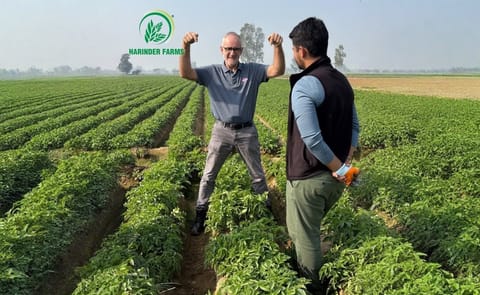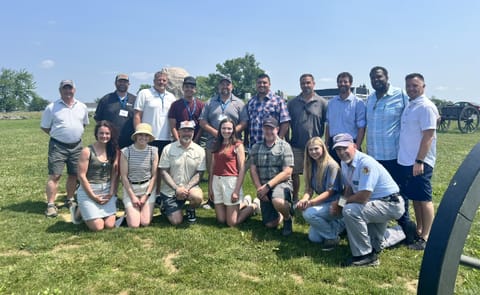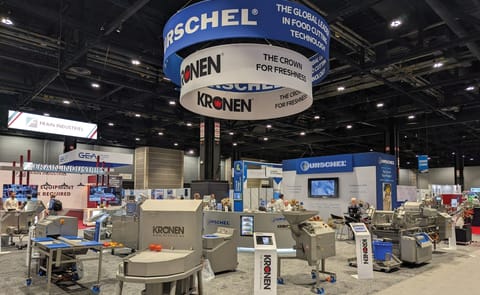Aaldrik Venhuizen and Cato Gaaikema
HZPC works with growers to future-proof seed potato cultivation

Growers learn best from other growers. This has been proven by the future-proof seed potato cultivation project, an initiative to examine upcoming changes in potato cultivation with a group of growers.
There are plenty of challenges: virus problems, decreasing use of plant protection products and increasing costs are set against a backdrop of unrelenting quality requirements.
To keep growers and other interested parties up to date with the group’s progress, there will be a regular feature in the Ruggespraak. Grower Cato Gaaikema and project supervisor Aaldrik Venhuizen kick it all off. They explain the structure and developments and talk about the first concrete project they are working on.
It is the afternoon after the interview. Cato calls. He is wondering whether Aaldrik’s added value was properly conveyed earlier in the day. 'He has immense knowledge and knows exactly how to deal with people. He was the go-to man at Agrifirm. If a crop did not want to grow, Aaldrik got involved.' He and Harm Steenhuis (Agronomist at HZPC) are the driving force behind this project.
Mutual respect
These details, provided by Cato, are indicative of the mutual respect in the group. The growers have enormous respect for each other as well as for the man who connects them: Aaldrik Venhuizen. Before his retirement, Aaldrik worked for Agrifirm for 34 years.
Aaldrik Venhuizen:
 The project Aaldrik was asked to work on is called Future-proof seed potato cultivation. HZPC is project leader. This allows us to keep the lines short, ensure everyone knows what is going on and can also call upon the expertise within HZPC.
The project Aaldrik was asked to work on is called Future-proof seed potato cultivation. HZPC is project leader. This allows us to keep the lines short, ensure everyone knows what is going on and can also call upon the expertise within HZPC.
Cato Gaaikema:
Cato Gaaikema is one of the 14 growers. He started 27 years ago, on the family’s arable farm together with his father in Oldehove, Groningen. Now he and his wife run an 86-hectare arable farm in Houwerzijl. They grow seed potatoes, cereals, sugar beet and grass seed with occasional forays into carrots.
They are also trying to revive pea farming in collaboration with a fellow livestock farmer. Cato is a little headstrong and has been thinking about the future for quite some time, for example, improving the soil.
Cato Gaaikema:
Aaldrik Venhuizen:
Cato Gaaikema:
During a group meeting at HZPC Research, Henri Stopin, R&D Manager HZPC France, presented a project from France. Here, they use a straw covering. Laying straw between potato plants means the aphids can no longer 'see' them.
Cato Gaaikema:
Cato Gaaikema:
Aaldrik Venhuizen:
New methods cost money.
Cato Gaaikema:
You go one step further every time. If you start working with straw, you need to think carefully about what you are getting into. The group quickly concluded that home-grown straw is a priority, to prevent the emergence of diseases and unwanted weeds. HZPC and Agrifirm have now picked up the gauntlet and are encouraging growers to participate.
Here in Groningen alone, over 100 hectares will be subject to the straw approach in the near future. And they have also heard that straw application is about to start in other places too.
Most farmers are decent people
The straw project has allowed farmers to demonstrate that new initiatives can get off the ground quickly. Yet they also want to convey to people that new developments do not simply happen by themselves.
Cato Gaaikema:
There are plenty of challenges: virus problems, decreasing use of plant protection products and increasing costs are set against a backdrop of unrelenting quality requirements.
To keep growers and other interested parties up to date with the group’s progress, there will be a regular feature in the Ruggespraak. Grower Cato Gaaikema and project supervisor Aaldrik Venhuizen kick it all off. They explain the structure and developments and talk about the first concrete project they are working on.
It is the afternoon after the interview. Cato calls. He is wondering whether Aaldrik’s added value was properly conveyed earlier in the day. 'He has immense knowledge and knows exactly how to deal with people. He was the go-to man at Agrifirm. If a crop did not want to grow, Aaldrik got involved.' He and Harm Steenhuis (Agronomist at HZPC) are the driving force behind this project.
Mutual respect
These details, provided by Cato, are indicative of the mutual respect in the group. The growers have enormous respect for each other as well as for the man who connects them: Aaldrik Venhuizen. Before his retirement, Aaldrik worked for Agrifirm for 34 years.
Aaldrik Venhuizen:
"When I retired, Frank van der Werff from HZPC called me. He talked about the changes coming their way, such as the fact that fewer and fewer crop protection products would be permitted, along with the requirement to sustain adequate quality. He also asked if I could also help HZPC with a new project."Sharing knowledge rather than educating
"I want to hand over the business one day. I want my successors to be able to carry it on. that will be my reward."

Aaldrik Venhuizen and Cato Gaaikema
Cato Gaaikema:
"In 2020, we all sat down together for the first time. Fourteen growers. Young and old. Spread across all growing regions in the Netherlands. Not too big a group. And it was all about knowledge sharing, rather than education. Because growers learn best from other growers."Discussions with the accountant
"People in large groups are sometimes reluctant to share mistakes. But this is often where you learn the most. That’s precisely why the group has to be manageable."
Cato Gaaikema is one of the 14 growers. He started 27 years ago, on the family’s arable farm together with his father in Oldehove, Groningen. Now he and his wife run an 86-hectare arable farm in Houwerzijl. They grow seed potatoes, cereals, sugar beet and grass seed with occasional forays into carrots.
They are also trying to revive pea farming in collaboration with a fellow livestock farmer. Cato is a little headstrong and has been thinking about the future for quite some time, for example, improving the soil.
Cato Gaaikema:
"I think that is also why I was approached to be in this group. I often have heated discussions with my accountant because rather than focussing on profitability, I sometimes miss out on making money because of choices I make for the future. But I want to hand over the business in a good way one day. So that my successors can carry on successfully. That will be my reward."Every company is also a pilot company.
Aaldrik Venhuizen:
"After approaching the participants, they visited each other to take a look behind the scenes. We then created a detailed description of these businesses."Cato Gaaikema:
"Everyone is working on something. It’s really interesting. To some extent, every company is also a pilot company, the only difference being that we feel the impact of mistakes instantly, in the market, whereas that’s not the case for real trial companies."The survey shows that viruses are a major issue for most growers.
Cato Gaaikema:
"Viruses are transmitted by aphids. In the past, the aphid was simply an aphid, and it had to die. But this method also had many drawbacks for the natural environment. And we live in a different world now."And while growers from Groningen look to the south to see how they deal with aphid problems there, in Zeeuws-Vlaanderen they look to their own south, i.e. to France.
During a group meeting at HZPC Research, Henri Stopin, R&D Manager HZPC France, presented a project from France. Here, they use a straw covering. Laying straw between potato plants means the aphids can no longer 'see' them.
Cato Gaaikema:
"And if it works out well in France, why shouldn’t we be able to do the same?’ Straw also adds structure to the soil. It means the soil retains moisture better."Swiss researcher Brice Dupies, the co-creator of the straw approach, was then invited to another meeting in Sneek. Thanks to his expertise, the threshold for Dutch growers to experiment has been significantly lowered.
Cato Gaaikema:
"There are always risks associated with new developments. They always cost money. Each grower must make their own assessments about which risks are manageable."Some members of the group participated in the straw experiment.
Aaldrik Venhuizen:
"After a year, we conducted another review. Which grower adapted what? I try to connect the growers’ approaches and share results from others. But they make up their own minds about what to do with this information on their own farms."Increasing hardware
New methods cost money.
Cato Gaaikema:
"The amount of hardware required on the farm is ever-increasing. You used to have one sprayer in the barn. Now you need various machines, including a mulching cultivator for no-till farming methods. Costs? Easily over EUR 10,000 (USD 10,994)."Cooperation is also clear in the straw project.
You go one step further every time. If you start working with straw, you need to think carefully about what you are getting into. The group quickly concluded that home-grown straw is a priority, to prevent the emergence of diseases and unwanted weeds. HZPC and Agrifirm have now picked up the gauntlet and are encouraging growers to participate.
Here in Groningen alone, over 100 hectares will be subject to the straw approach in the near future. And they have also heard that straw application is about to start in other places too.
Most farmers are decent people
The straw project has allowed farmers to demonstrate that new initiatives can get off the ground quickly. Yet they also want to convey to people that new developments do not simply happen by themselves.
Cato Gaaikema:
"It wasn’t that long ago when ploughing was the norm but, over the years, we have changed our minds about that. Nowadays, thanks to green manure, the land is more often green than brown in winter, and the no till farming method is also gaining ground in farm operations."Aaldrik Venhuizen:
"Finding a new balance is a journey of discovery and takes time. So, give the industry the benefit of the doubt and, above all, help where you can. After all, we only have seven crop years left before 2030. We have plenty of enthusiasm, and you can sense a great deal of positive energy among the growers."
"The other day I read a book about how it helps to look at people positively. This also applies to growers; most farmers are decent people."
¿Te gustaría recibir noticias como esta por correo electrónico? ¡Únete y suscríbete!
Get the latest potato industry news straight to your WhatsApp. Join the PotatoPro WhatsApp Community!
Empresa Destacada
Contenido Patrocinado
Contenido Patrocinado
Contenido Patrocinado
Contenido Patrocinado










